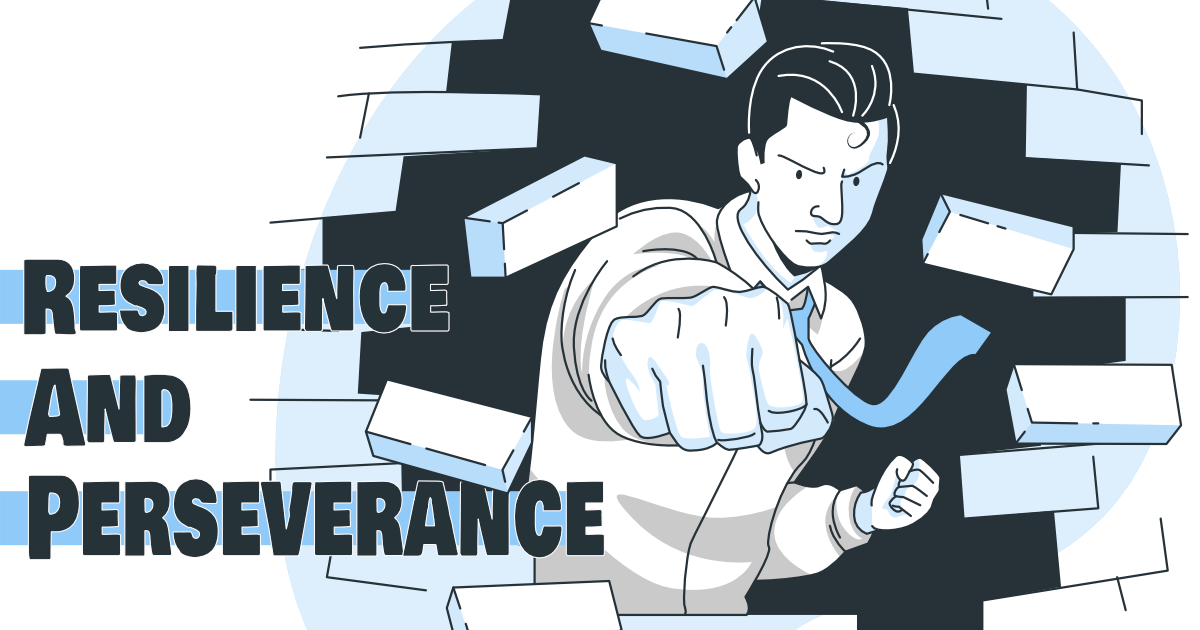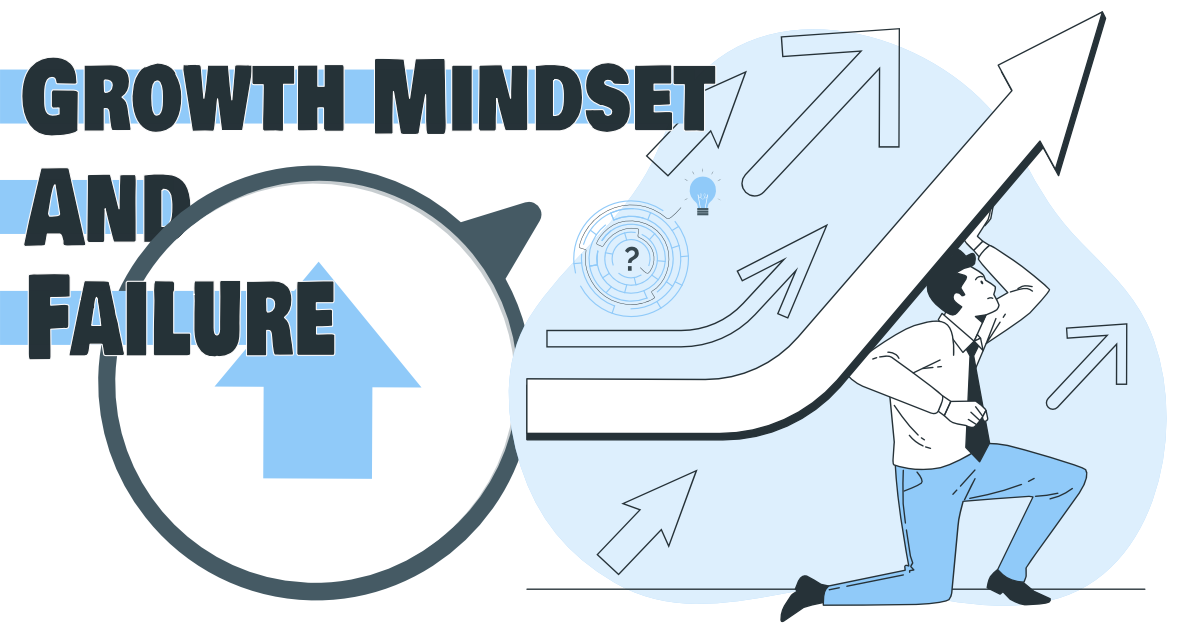Resilience and perseverance are critical traits for entrepreneurs. Starting a business is a challenging and uncertain journey, and entrepreneurs need to have the mental and emotional toughness to navigate through difficulties, overcome obstacles, and bounce back from failures. In this sub-topic, we will delve into the role of resilience and perseverance in entrepreneurial success and explore the various strategies and techniques that entrepreneurs can adopt to develop and sustain these qualities. Whether it is weathering economic downturns, dealing with rejection, or adapting to market changes, having resilience and perseverance enables entrepreneurs to stay focused, motivated, and persistent in their pursuit of success.
Understanding what resilience is and why it’s important for entrepreneurs
Resilience is the ability to adapt and bounce back from challenging situations and setbacks. It is a crucial trait for entrepreneurs as they face numerous obstacles and challenges in their pursuit of success. In this article, we will explore what resilience is, why it is important for entrepreneurs, and how to cultivate it.
What is Resilience?
Resilience is a combination of personal characteristics and coping strategies that enable individuals to navigate through adverse situations and come out stronger. It encompasses the ability to remain optimistic and hopeful, maintain a positive outlook, and keep working towards goals despite obstacles.
Why is Resilience Important for Entrepreneurs?
Entrepreneurship is a challenging and unpredictable journey, and resilience is an essential quality that helps entrepreneurs overcome obstacles, bounce back from setbacks, and keep moving forward. Resilient entrepreneurs are better equipped to handle stress, pressure, and uncertainty, and are more likely to persist in the face of adversity.
How to Cultivate Resilience?
- Develop a Growth Mindset: Cultivate a growth mindset by embracing challenges and viewing setbacks as opportunities for growth and learning.
- Practice Self-Care: Take care of your physical and mental well-being through regular exercise, healthy eating, and sufficient sleep.
- Seek Support: Build a strong support system of family, friends, and colleagues who can offer encouragement and help you through tough times.
- Stay Positive: Focus on the positive aspects of a situation and look for ways to find meaning and purpose in challenging times.
- Embrace Failure: Embrace failure as a natural part of the learning process and use it to inform future decisions.
Conclusion
In conclusion, resilience is a critical quality for entrepreneurs, and cultivating it can lead to greater success and fulfillment. By developing a growth mindset, practicing self-care, seeking support, staying positive, and embracing failure, entrepreneurs can build the resilience they need to navigate the ups and downs of entrepreneurship.
Strategies for building and maintaining resilience in the face of challenges
As an entrepreneur, you will face many challenges and obstacles along the way. It’s essential to have the resilience to overcome these challenges and continue pushing forward towards your goals. Resilience is the ability to adapt and recover quickly from setbacks, and it’s a critical aspect of success in entrepreneurship.
Here are some strategies for building and maintaining resilience:
- Cultivate a growth mindset
One of the best ways to build resilience is to adopt a growth mindset. This means embracing challenges and failures as opportunities for growth and learning, rather than letting them hold you back. Cultivating a growth mindset will help you persevere through tough times and keep pushing forward.
- Practice self-care
Self-care is an essential part of maintaining resilience. When you take care of yourself, both physically and mentally, you’re better equipped to handle the challenges of entrepreneurship. Make sure to get enough sleep, exercise regularly, and eat a balanced diet to keep your body and mind healthy.
- Surround yourself with supportive people
Surrounding yourself with supportive people can make a big difference in your resilience. Having a network of friends and family who believe in you and your goals can help boost your confidence and provide you with a source of strength during difficult times.
- Seek out mentorship
Working with a mentor who has been through similar challenges can be incredibly helpful for building resilience. They can provide you with guidance and support, and help you stay motivated and focused on your goals.
- Set achievable goals
Setting achievable goals and breaking them down into smaller, manageable steps can help you build resilience by giving you a sense of progress and accomplishment. This will also help you stay motivated and focused, even when faced with setbacks.
- Stay positive
Maintaining a positive attitude is essential for resilience. Try to focus on the good things in your life, and practice gratitude. This will help you stay optimistic and motivated, even during tough times.
- Seek help when needed
It’s okay to seek help when you need it. Whether it’s talking to a therapist, joining a support group, or seeking the advice of a trusted friend, reaching out for help can provide you with the support you need to overcome challenges and build resilience.
Conclusion
Building resilience is a critical aspect of success in entrepreneurship. By adopting a growth mindset, practicing self-care, surrounding yourself with supportive people, seeking out mentorship, setting achievable goals, staying positive, and seeking help when needed, you can build and maintain resilience in the face of challenges.
How to bounce back from setbacks and failures
Entrepreneurship is not without its challenges, and setbacks and failures are a natural part of the journey. However, it is how you respond to these setbacks and failures that can determine your success. In this article, we will explore the key strategies for bouncing back from setbacks and failures, and how to turn these challenges into opportunities for growth and success.
- Accept and embrace the situation
The first step in bouncing back from setbacks and failures is to accept and embrace the situation. This means acknowledging that the setback or failure has occurred, and that it is a natural part of the entrepreneurial journey. It is important to avoid dwelling on the negative aspects of the situation and instead focus on what can be learned from it.
- Reflect and learn from the experience
Once you have accepted the situation, the next step is to reflect and learn from the experience. This means taking the time to analyze what went wrong, what could have been done differently, and what lessons can be learned from the experience. It is important to be honest with yourself, and to use the experience as an opportunity for growth and development.
- Re-evaluate and adjust your goals
Setbacks and failures can often be a result of unrealistic goals or expectations. It is important to re-evaluate your goals in light of the setback or failure, and to adjust them as needed. This may mean changing the timeline, the approach, or the goal itself. It is important to ensure that your goals are achievable, realistic, and aligned with your values and priorities.
- Seek support and guidance
Bouncing back from setbacks and failures can be challenging, and it is important to seek support and guidance. This may come in the form of family and friends, a mentor, or a coach. It is important to surround yourself with positive and supportive people who will help you navigate through the challenges and provide you with the encouragement and motivation you need to keep moving forward.
- Stay positive and maintain perspective
Finally, it is important to stay positive and maintain perspective. This means focusing on the things that are going well, and maintaining a positive outlook even in the face of adversity. It is important to remember that setbacks and failures are temporary, and that success is a journey, not a destination.
Actionable Tips
- Keep a journal to reflect on setbacks and failures and the lessons learned
- Surround yourself with positive and supportive people who will encourage and motivate you
- Focus on the things that are going well, and maintain a positive outlook
- Take breaks and engage in activities that bring you joy and peace
- Celebrate your successes and acknowledge your progress, no matter how small.
Conclusion
Bouncing back from setbacks and failures is an essential part of the entrepreneurial journey. By accepting and embracing the situation, reflecting and learning from the experience, re-evaluating and adjusting your goals, seeking support and guidance, and staying positive and maintaining perspective, you can turn setbacks and failures into opportunities for growth and success.
The importance of developing a “never give up” attitude
Resilience and perseverance are key qualities that are essential for the success of entrepreneurs. Having a never give up attitude can make all the difference in overcoming the challenges that come with starting and running a business. This article will discuss the importance of developing a never give up attitude and provide tips and strategies for maintaining a positive outlook even in the face of adversity.
Why is a never give up attitude important?
A never give up attitude is essential because it helps entrepreneurs to stay motivated and focused even when they encounter obstacles and setbacks. This mindset allows entrepreneurs to persist in their pursuit of success despite challenges and setbacks, and it enables them to bounce back quickly from failure. Without a never give up attitude, entrepreneurs may give up too easily and fail to achieve their goals.
How to develop a never give up attitude?
- Practice gratitude: Gratitude is a powerful tool that can help entrepreneurs to maintain a positive outlook and a never give up attitude. Practicing gratitude helps entrepreneurs to focus on what they have, rather than what they lack, and it enables them to appreciate the good in their lives.
- Surround yourself with positive people: Surrounding yourself with positive, supportive people can help you to maintain a never give up attitude. These people can provide encouragement and inspiration when you need it most, and they can help you to stay focused on your goals.
- Focus on your strengths: Focusing on your strengths can help you to develop a never give up attitude. When you focus on what you are good at, you are more likely to feel confident and motivated to pursue your goals.
- Set achievable goals: Setting achievable goals is an effective way to maintain a never give up attitude. When you set achievable goals, you are more likely to feel motivated and inspired, and you are less likely to give up when faced with obstacles and setbacks.
- Celebrate your successes: Celebrating your successes is a great way to reinforce a never give up attitude. When you acknowledge and celebrate your achievements, you are more likely to feel motivated and inspired to keep pursuing your goals.
Actionable Tips
- Practice gratitude every day by writing down three things you are grateful for.
- Surround yourself with positive and supportive people who believe in you and your goals.
- Identify your strengths and focus on developing them.
- Set achievable goals and create a plan to achieve them.
- Celebrate your successes, no matter how small, and acknowledge your achievements.
Conclusion
Having a never give up attitude is essential for the success of entrepreneurs. By practicing gratitude, surrounding yourself with positive people, focusing on your strengths, setting achievable goals, and celebrating your successes, entrepreneurs can develop and maintain a never give up attitude. This positive outlook will enable them to overcome challenges and setbacks, and it will help them to achieve their goals and succeed in their businesses.
The power of positive self-talk and visualization in building resilience
Resilience is a crucial attribute for entrepreneurs to possess in order to succeed in their ventures. Positive self-talk and visualization are two powerful tools that can help individuals cultivate resilience and overcome obstacles along their entrepreneurial journey. These techniques can help to boost one’s self-confidence, motivation, and determination in the face of challenges.
What is Positive Self-Talk?
Positive self-talk refers to the practice of speaking kindly and affirmatively to oneself. It involves replacing negative self-talk and thoughts with positive and encouraging ones. This can help to build self-esteem, foster a more positive outlook, and boost one’s resilience in the face of obstacles and challenges.
Why is Positive Self-Talk Important for Resilience?
Positive self-talk helps individuals to view challenges as opportunities for growth and learning, rather than insurmountable obstacles. It can help to foster a growth mindset and reduce stress and anxiety, leading to increased motivation and determination.
How to Practice Positive Self-Talk?
- Identify Negative Thoughts: The first step in practicing positive self-talk is to identify any negative thoughts or beliefs that you may have about yourself.
- Replace Negative Thoughts with Positive Ones: Once you have identified the negative thoughts, replace them with positive affirmations. For example, if you have the thought “I am not good enough,” replace it with “I am capable and worthy.”
- Repeat Daily: Repeat these affirmations daily, either out loud or in your head. The more you repeat them, the more they will become a part of your belief system.
- Surround Yourself with Positive People: Surround yourself with positive and supportive people who will encourage you and reinforce your positive self-talk.
What is Visualization?
Visualization refers to the practice of imagining a desired outcome or scenario in your mind’s eye. This technique involves creating a vivid, detailed mental image of what you want to achieve and focusing on it regularly. It can help to increase motivation, focus, and resilience by making your goals and aspirations seem more tangible and attainable.
Why is Visualization Important for Resilience?
Visualization helps to increase confidence and motivation by making your goals and aspirations seem more achievable. It also helps to reduce stress and anxiety by creating a mental escape from the challenges and obstacles you may be facing. By regularly visualizing yourself overcoming these challenges and achieving your goals, you are training your brain to see yourself as resilient and capable.
How to Practice Visualization?
- Choose a Specific Goal or Outcome: Choose a specific goal or outcome that you would like to achieve, such as starting a successful business, making a big sales pitch, or overcoming a specific obstacle.
- Create a Detailed Mental Image: Close your eyes and create a vivid, detailed mental image of yourself achieving this goal or outcome. Imagine every detail, from the sights and sounds to the emotions you feel.
- Practice Regularly: Practice visualization regularly, ideally daily, for 5-10 minutes at a time. The more you practice, the more natural and effortless it will become.
- Combine with Positive Self-Talk: Combine visualization with positive self-talk to further boost your resilience. As you visualize yourself achieving your goals, repeat positive affirmations to yourself, such as “I am capable and resilient” or “I will succeed in this challenge.”
Conclusion
Positive self-talk and visualization are powerful tools that can help entrepreneurs to build and maintain resilience in the face of challenges. By regularly practicing these techniques, individuals can increase their self-confidence, motivation, and determination, helping them to overcome obstacles and achieve their goals.
Tips for staying motivated and focused during tough times
Resilience and perseverance are critical traits for entrepreneurs to have, especially when they face challenging situations and setbacks. However, it can be difficult to stay motivated and focused when the going gets tough. In this article, we will look at some effective tips for staying motivated and focused during tough times, so that entrepreneurs can overcome challenges and keep moving forward.
- Set realistic and achievable goals
One of the best ways to stay motivated and focused is to set realistic and achievable goals. When you have a clear destination in mind, it is easier to stay motivated and focused. Make sure your goals are specific, measurable, attainable, relevant, and time-bound (SMART).
- Surround yourself with positive and supportive people
The people we surround ourselves with can have a huge impact on our motivation and focus. Make sure to surround yourself with positive, supportive, and encouraging people who believe in your vision and can provide you with the motivation and inspiration you need to keep going.
- Celebrate small wins
It is important to acknowledge and celebrate your progress, no matter how small. Celebrating small wins can help keep you motivated and focused and can help you stay positive even when things are tough.
- Focus on the present moment
Entrepreneurs often have a lot on their minds, and it can be easy to get caught up in worry and stress about the future. To stay motivated and focused, it is important to focus on the present moment and what you can do right now to make progress towards your goals.
- Find a support system
Having a support system can be incredibly helpful when things get tough. This could be a mentor, a coach, a friend, or a family member who you can turn to for support and encouragement.
- Get enough sleep and exercise
It is important to take care of your physical and mental health to stay motivated and focused. Make sure to get enough sleep, eat healthy, and get regular exercise to keep your body and mind in top condition.
- Reframe negative thoughts
It is easy to get caught up in negative thoughts when things are tough. To stay motivated and focused, it is important to reframe negative thoughts and focus on the positive aspects of your situation.
Actionable Tips
- Set specific, measurable, attainable, relevant, and time-bound (SMART) goals
- Surround yourself with positive and supportive people
- Celebrate small wins
- Focus on the present moment
- Find a support system
- Get enough sleep and exercise
- Reframe negative thoughts
Conclusion
Staying motivated and focused during tough times can be a challenge, but it is important for entrepreneurs to overcome obstacles and keep moving forward. By following these tips, entrepreneurs can maintain their motivation and focus and continue to make progress towards their goals, even when things get tough.
The role of support systems in building resilience
Resilience is a crucial ingredient for success as an entrepreneur, and support systems play a significant role in helping individuals build and maintain it. Support systems can take various forms, including family, friends, mentors, coaches, and even online communities. Having a strong network of supportive people can help individuals overcome the challenges they face and emerge stronger and more resilient.
What are support systems?
Support systems are the people and resources that provide emotional, mental, and sometimes physical support to individuals during difficult times. They can provide encouragement, advice, comfort, and a sense of belonging. For entrepreneurs, support systems can help them stay motivated and focused, reduce stress, and increase their chances of success.
Why are support systems important for building resilience?
Support systems are essential for building resilience because they provide a safety net for individuals during difficult times. When individuals face challenges, they often feel overwhelmed and unsure of how to proceed. Having a support system in place can help individuals feel less alone and more empowered to overcome obstacles.
For entrepreneurs, support systems can also provide a sounding board for ideas, help with problem-solving, and provide a source of inspiration. Having individuals who believe in them and are rooting for their success can give entrepreneurs the confidence they need to keep pushing forward.
How to build a support system
Building a support system takes time and effort, but it is well worth it. Here are some tips for building a strong and supportive network:
- Surround yourself with positive and supportive individuals: Seek out people who have a positive outlook on life, who believe in you, and who are willing to provide encouragement and support.
- Utilize online communities: Online communities can be a great source of support for entrepreneurs, especially for those who work from home or are isolated in their work environment. Joining online forums, groups, or social media networks centered around your interests or industry can help you connect with like-minded individuals.
- Seek out mentors: Mentors can provide valuable guidance and support as you navigate the ups and downs of entrepreneurship. Look for individuals who have experience in your industry and are willing to offer advice and support.
- Take advantage of coaching programs: Coaching programs can provide a structured way for entrepreneurs to receive support and guidance as they grow their businesses. Many programs offer one-on-one coaching sessions, group coaching, and workshops to help entrepreneurs build resilience and overcome challenges.
- Make time for self-care: Taking care of yourself is an important part of building resilience. Making time for activities that you enjoy, such as exercise, reading, or spending time with friends, can help reduce stress and increase your overall well-being.
Actionable Tips
- Identify individuals in your life who are positive and supportive.
- Join online communities centered around your interests or industry.
- Seek out mentors who have experience in your industry.
- Consider participating in a coaching program.
- Make time for self-care activities that reduce stress and increase well-being.
Conclusion
Support systems play a critical role in helping entrepreneurs build and maintain resilience in the face of challenges. By surrounding yourself with positive and supportive individuals, utilizing online communities, seeking out mentors, participating in coaching programs, and making time for self-care, entrepreneurs can increase their chances of success and bounce back from setbacks more quickly.
The importance of self-care and mental well-being in building resilience
Self-care and mental well-being play a critical role in building resilience for entrepreneurs. Resilience is a vital attribute for entrepreneurs as it allows them to overcome the challenges and setbacks that come with starting and running a business. When an entrepreneur’s mental health and well-being are compromised, it can negatively impact their ability to stay focused, motivated, and resilient in the face of obstacles.
What is self-care and mental well-being?
Self-care refers to the actions and activities that individuals engage in to maintain their physical, mental, and emotional health. It can range from basic self-care activities such as eating nutritious food and getting enough sleep to more significant self-care practices like seeking therapy or practicing mindfulness. Mental well-being, on the other hand, refers to an individual’s overall sense of happiness and satisfaction with their life.
Why is self-care and mental well-being important for building resilience?
Self-care and mental well-being are crucial for building resilience because they help entrepreneurs maintain their energy levels, focus, and motivation. When entrepreneurs take care of their physical, mental, and emotional health, they are better equipped to handle the stress and pressure that come with starting and running a business. Additionally, when entrepreneurs are in a positive state of mind, they are more likely to approach challenges and setbacks with a growth mindset, which can help them find creative solutions to overcome obstacles.
Step-by-Step Guide
- Identify self-care activities that work for you:It’s essential to identify self-care activities that work for you and make them a regular part of your routine. This could be anything from reading for 30 minutes before bed to taking a yoga class once a week.
- Prioritize self-care: Make self-care a priority in your life, and carve out time in your schedule to engage in self-care activities. This could mean waking up a little earlier or staying up a little later, but it’s essential to prioritize self-care to maintain your mental and emotional well-being.
- Seek support when needed: It’s okay to reach out for help when you need it. Whether that’s talking to a trusted friend, seeking therapy, or joining a support group, seeking support can be an essential part of self-care and mental well-being.
- Practice mindfulness: Mindfulness is a powerful tool for promoting mental well-being. It involves paying attention to the present moment without judgment and can be practiced through meditation, deep breathing, or simply being present in the moment.
- Focus on the present: In addition to practicing mindfulness, it’s essential to focus on the present moment. This means letting go of worries about the future and regrets about the past and instead focusing on what you can do in the present moment to care for yourself and your business.
- Engage in physical activity: Physical activity is a great way to boost mental well-being. Whether that’s going for a run, practicing yoga, or taking a walk in nature, incorporating physical activity into your self-care routine can help you maintain your resilience and mental well-being.
Actionable Tips
- Incorporate physical exercise into your routine: Regular physical activity has been shown to boost resilience by reducing stress and anxiety. This can be as simple as taking a walk outside, doing yoga, or hitting the gym.
- Maintain a healthy diet: Eating a nutritious diet can help keep your mind and body healthy, and reduce the effects of stress. Focus on eating plenty of fruits and vegetables, whole grains, and lean proteins.
- Practice mindfulness: Mindfulness meditation has been shown to help people better cope with stress and increase their resilience. Try to practice mindfulness for a few minutes every day, either through meditation or simply focusing on the present moment.
- Surround yourself with supportive people: Having a strong support system can make all the difference when facing challenges. Make sure to spend time with people who uplift and encourage you, and avoid those who bring you down.
- Get enough sleep: A good night’s sleep can help you recharge and feel more energized, which can help increase your resilience. Try to establish a consistent sleep schedule and aim for 7-9 hours of sleep each night.
- Set achievable goals: Setting goals for yourself can help you feel more in control and give you a sense of purpose. Make sure to set realistic and achievable goals, and celebrate your progress along the way.
- Seek help when needed: It’s important to remember that seeking help is a sign of strength, not weakness. If you’re struggling with stress or mental health issues, don’t hesitate to reach out to a friend, family member, or professional for support.
- Practice gratitude: Taking time each day to reflect on the things you’re thankful for can help shift your focus from what’s going wrong to what’s going right. Keeping a gratitude journal or sharing your grateful thoughts with a friend can also help boost your resilience.
Conclusion
Building resilience is an ongoing process and requires a combination of strategies, self-care, support, and a positive outlook. Entrepreneurs must be prepared to face challenges and setbacks in their entrepreneurial journey, and the key to bouncing back is resilience. Whether it is developing a never give up attitude, practicing positive self-talk, or seeking support from a network, there are many ways to build and maintain resilience. By following the tips outlined in this article, entrepreneurs can become better equipped to overcome obstacles and achieve their goals.
How to develop a growth mindset and learn from failure
As an entrepreneur, facing challenges, setbacks, and failures is an inevitable part of the journey. However, how one perceives and approaches these obstacles can significantly impact their resilience and perseverance towards success. Developing a growth mindset and learning from failure can be key factors in building resilience and achieving entrepreneurial success.
What is a Growth Mindset?
A growth mindset is the belief that abilities and intelligence can be developed through effort, learning, and dedication. Those with a growth mindset see failure as a learning opportunity, while those with a fixed mindset see it as a reflection of their inherent abilities.
Why is it important for entrepreneurs?
Adopting a growth mindset can have a significant impact on an entrepreneur’s resilience and ability to overcome challenges. Entrepreneurs with a growth mindset are more likely to persist in the face of obstacles and view setbacks as opportunities for growth and learning. This can lead to increased innovation and improved problem-solving skills.
How to Develop a Growth Mindset?
- Embrace challenges: View challenges as opportunities for growth and learning, rather than as threats to your abilities.
- Practice gratitude: Focus on the positive aspects of your life and be thankful for the opportunities that challenges provide.
- Reframe failure: Instead of seeing failure as a reflection of your abilities, view it as a valuable learning opportunity.
- Seek feedback: Seek constructive feedback from others and use it as a way to identify areas for growth and improvement.
- Focus on effort: Instead of focusing on results, focus on the effort and dedication you put into your work.
Examples of Growth Mindset in Action
- Mark Zuckerberg, the founder of Facebook, embraced failure early on in his career and viewed it as an opportunity to learn and grow.
- Oprah Winfrey, media mogul, faced numerous setbacks and failures throughout her career but instead of giving up, she used them as a means to grow and become stronger.
Best Practices
- Surround yourself with positive and supportive individuals who encourage a growth mindset.
- Read books and articles on the topic of growth mindset to expand your understanding and knowledge.
- Embrace failure and view it as a learning opportunity.
- Practice gratitude and focus on the positive aspects of your life.
- Seek feedback and use it as a means for growth and improvement.
Actionable Tips
- Write down your thoughts and feelings when faced with failure or setback.
- Take a break from the situation and engage in activities that bring you joy and relaxation.
- Focus on the process, not just the end result.
- Reflect on past experiences and identify areas where you have grown as a result of challenges or setbacks.
- Surround yourself with positive and supportive individuals who encourage a growth mindset.
Conclusion
Developing a growth mindset and learning from failure can have a significant impact on an entrepreneur’s resilience and ability to overcome challenges. Embracing challenges, practicing gratitude, reframing failure, seeking feedback, and focusing on effort are all key strategies for developing a growth mindset. Remember that failure is an inevitable part of the entrepreneurial journey and that the ability to bounce back and learn from these experiences is what sets successful entrepreneurs apart.
The role of resilience in leadership and decision-making
Leadership and decision-making are critical components of success for entrepreneurs. Resilience, the ability to recover quickly from difficulties, can play a significant role in how leaders approach challenges and make decisions. In this article, we’ll discuss the importance of resilience in leadership and decision-making, and provide tips for developing resilience skills.
What is the role of resilience in leadership and decision-making?
Resilience helps leaders to remain calm and focused, even in the face of adversity. It enables them to bounce back from setbacks and failures, and to maintain a positive outlook in the face of challenges. Additionally, resilience allows leaders to maintain their confidence and determination, even in the face of uncertainty and change. This, in turn, enables them to make better decisions and to lead their teams more effectively.
Why is resilience important in leadership and decision-making?
Leaders who are resilient are better equipped to handle the challenges that come with running a business. They are able to stay focused and motivated, even when things aren’t going as planned. This allows them to make quick, decisive decisions, which is crucial in the fast-paced world of entrepreneurship. Additionally, resilience enables leaders to keep their teams motivated and engaged, even when they’re facing difficulties.
How can you develop resilience in leadership and decision-making?
There are several strategies that leaders can use to develop resilience skills:
- Embrace challenges: Instead of avoiding challenges, embrace them as opportunities for growth.
- Practice positive self-talk: Replace negative thoughts with positive affirmations to maintain a positive outlook.
- Cultivate a growth mindset: Focus on learning and growth, instead of perfection.
- Seek support: Surround yourself with people who support and encourage you.
- Take care of your mental and physical well-being: Practice self-care and prioritize your mental and physical health.
- Learn from failures: Instead of dwelling on failures, focus on what you can learn from them.
Examples
- Steve Jobs, the co-founder of Apple, is a great example of a resilient leader. He was known for his ability to bounce back from setbacks and failures, and to maintain his focus and determination even in the face of adversity. Additionally, he was known for his innovative approach to problem-solving and his ability to make quick, decisive decisions.
Real-Life Scenarios
Consider a scenario where a business is facing a downturn. A resilient leader would take a proactive approach to addressing the issue, by seeking out new opportunities, identifying areas for improvement, and developing a plan to overcome the challenges. By contrast, a leader who lacks resilience may become overwhelmed by the situation, and may struggle to make effective decisions.
Best Practices
- Embrace challenges as opportunities for growth
- Focus on positive self-talk
- Cultivate a growth mindset
- Seek support from others
- Prioritize mental and physical well-being
- Learn from failures and use them as opportunities for growth.
Actionable Tips
- Write down positive affirmations and read them daily to maintain a positive outlook.
- Set achievable goals and celebrate your progress along the way.
- Take time to reflect on your failures and identify what you can learn from them.
- Surround yourself with people who support and encourage you.
- Practice self-care and prioritize your mental and physical health.
Conclusion
In conclusion, resilience plays a crucial role in leadership and decision-making. Leaders who possess resilience have the ability to adapt to change, overcome challenges, and make effective decisions even in the face of adversity. By developing resilience, leaders can not only improve their own performance, but also set a positive example for their team, organization, and stakeholders. To develop resilience in leadership and decision-making, it is important to have a growth mindset, maintain a positive outlook, and practice self-care and mental well-being.
Resources and References
- “The Resilience Factor: 7 Essential Skills for Overcoming Life’s Inevitable Obstacles” by Karen Reivich and Andrew Shatte
- “Mindset: The New Psychology of Success” by Carol Dweck
- “The Resilience Factor: 7 Keys to Finding Your Inner Strength and Overcoming Life’s Hurdles” by Karen Reivich and Andrew Shatte
- “The Lean Entrepreneur: How to Accomplish More by Doing Less” by Brant Cooper and Patrick Vlaskovits
- “Bounce: The Art of Turning Tough Times into Triumph” by Mitt Romney and Timothy Dexter
- “Resilience: Hard-Won Wisdom for Living a Better Life” by Eric Greitens
- “The Power of Resilience: Achieving Balance, Confidence, and Personal Strength in Your Life” by Robert Brooks and Sam Goldstein.
- “The Power of Positive Thinking” by Norman Vincent Peale
- “Think and Grow Rich” by Napoleon Hill
- “The 7 Habits of Highly Effective People” by Stephen Covey
- “Visualize and Achieve Your Dreams” by Dr. Wayne W. Dyer.
- “The Power of Resilience: How to Navigate Life’s Challenges and Come Out Stronger” by Roberta R. Neault
- “Bouncing Back: Rewiring Your Brain for Maximum Resilience and Well-Being” by Linda Graham
- “The Art of Resilience: 100 Paths to Wisdom and Strength in an Uncertain World” by Eric Greitens
- “The 5 AM Club: Own Your Morning, Elevate Your Life” by Robin Sharma
- “Grit: The Power of Passion and Perseverance” by Angela Duckworth
- “The Lean Startup: How Today’s Entrepreneurs Use Continuous Innovation to Create Radically Successful Businesses” by Eric Ries
- “The Power of Resilience: How the Best Companies Manage the Unexpected” by Yves Doz and Keeley Wilson.













